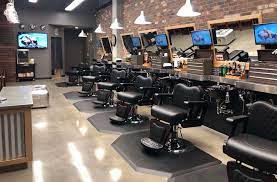Barber shops have long been more than just places to get a haircut. They’re social hubs, cultural icons, and often serve as the beating heart of communities. From their humble beginnings to the modern-day resurgence, barber shops have evolved significantly, reflecting changes in society, culture, and fashion. In this article, we’ll delve into the rich history and evolving landscape of barber shop culture, exploring its significance and the factors driving its evolution.
The Origin of Barber Shops:
Barbering is one of the oldest professions in the world, with roots dating back to ancient civilizations. In ancient Egypt, barbers held esteemed positions, not just as groomers but also as healers and spiritual advisors. The iconic barber’s pole, with its red and white stripes representing blood and bandages, traces its origins to these early barbers, who performed surgeries alongside haircuts.
Barber shops became more commonplace in Europe during the Middle Ages, serving as centers for socializing and news-sharing in addition to grooming services. The barber-surgeon distinction persisted, with barbers offering services ranging from haircuts to tooth extractions and bloodletting.
The Evolution of Barber Shop Culture:
As societies evolved, so did barber shop culture. In the 19th century, barber shops flourished in America, becoming integral to the fabric of communities. They were places where men could gather, converse, and engage in discussions about politics, sports, and local gossip. The barber shop emerged as a symbol of masculinity and camaraderie, often adorned with leather chairs, straight razors, and tobacco smoke lingering in the air.
During the early to mid-20th century, the barber shop reached its zenith, becoming an institution in American culture. It was a place where men sought not just haircuts but also advice, camaraderie, and a sense of belonging. The barber became a trusted confidant, offering a listening ear and words of wisdom along with a precise shave or trim.
However, with the rise of unisex salons and chains offering quick, inexpensive haircuts, the traditional barber shop faced challenges. Many shops closed their doors, unable to compete with the convenience and affordability of these new competitors. Yet, despite these challenges, barber shop culture endured, fueled by a sense of nostalgia and a yearning for authentic experiences.
The Modern Resurgence:
In recent years, there has been a resurgence of interest in traditional barber shops, driven in part by a desire for authenticity in an increasingly digitized and impersonal world. Men, in particular, have sought out these spaces as sanctuaries where they can escape the pressures of daily life and reconnect with tradition.
Moreover, the revival of barber shop culture can be attributed to a growing appreciation for craftsmanship and artisanal skills. In an era dominated by mass production and disposable consumer goods, the meticulous attention to detail and handcrafted quality found in traditional barber shops holds a unique allure.
Furthermore, the rise of social media has played a significant role in the resurgence of barber shop culture. Platforms like Instagram have enabled barbers to showcase their work to a global audience, attracting clients who appreciate the artistry and skill involved in traditional barbering techniques.
The Modern Barber Shop Experience:
Today’s barber shop Mississauga offer more than just haircuts; they provide immersive experiences that cater to all the senses. From the moment you step through the door, you’re greeted by the nostalgic scent of bay rum and the sound of classic rock playing softly in the background. The decor harks back to a bygone era, with vintage barber chairs, old-school barber poles, and framed photographs lining the walls.
But it’s not just about aesthetics; it’s also about the personal touch. Modern barbers take the time to get to know their clients, listening attentively to their needs and preferences. Whether it’s a classic pompadour or a modern fade, they possess the skill and expertise to deliver impeccable results.
Moreover, many barber shops offer additional services such as hot towel shaves, beard trims, and grooming products tailored to the individual needs of their clients. It’s a holistic approach to grooming that goes beyond mere aesthetics, emphasizing self-care and well-being.
The Future of Barber Shop Culture:
As we look to the future, it’s clear that barber shop culture will continue to evolve, adapting to changing trends and tastes while preserving its timeless appeal. While traditional barber shops will always have their place, we can expect to see new innovations and trends emerge, reflecting the evolving needs and preferences of consumers.
For example, we may see an increased emphasis on sustainability and eco-friendliness, with barber shops adopting practices such as zero-waste packaging and organic grooming products. There may also be a greater focus on inclusivity, with barber shops catering to a diverse clientele and offering services tailored to people of all genders and backgrounds.
Ultimately, what sets barber shop culture apart is its sense of community and connection. In an increasingly fragmented world, barber shops serve as oases of warmth and camaraderie, where strangers become friends and conversations flow freely. As long as there are people seeking human connection and a sense of belonging, the barber shop will endure as a cherished institution.
Conclusion:
In conclusion, barber shop culture has undergone a remarkable evolution, from its ancient origins to its modern-day resurgence. What began as a simple trade has blossomed into a multifaceted cultural phenomenon, embodying the timeless values of craftsmanship, camaraderie, and tradition.
As we continue to navigate the complexities of the modern world, the barber shop stands as a beacon of authenticity and human connection. It’s a place where the past and present converge, where stories are shared, and memories are made. And in an age of constant change, it’s comforting to know that some things, like the enduring appeal of the barber shop, will never go out of style.
